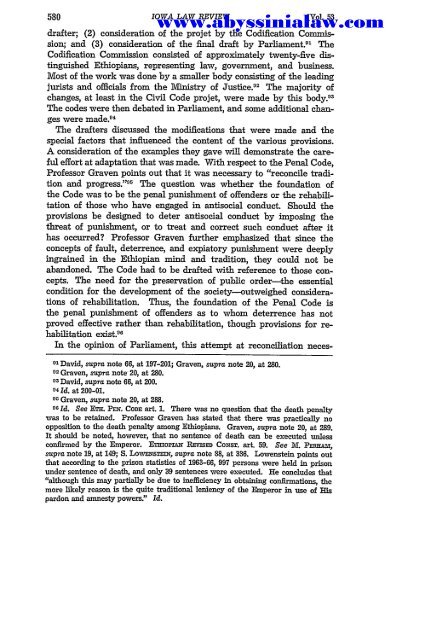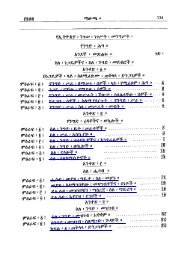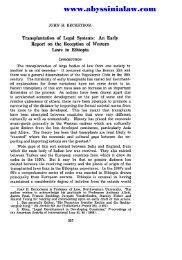You also want an ePaper? Increase the reach of your titles
YUMPU automatically turns print PDFs into web optimized ePapers that Google loves.
IOWA LAW REVIEW<br />
drafter; (2) consideration of the projet by the Codification Commission;<br />
and (3) consideration of the final draft by Parliament. 91 The<br />
Codification CommisSion consisted of approximately twenty-five distinguished<br />
Ethiopians, representing law, government, and business.<br />
Most of the work was done by a smaller body consisting of the leading<br />
jurists and officials from the Ministry of Justice. 92 The majority of<br />
changes, at least in the Civil Code projet, were made by this body. 93<br />
The codes were then debated in Parliament, and some additional changes<br />
were made.94<br />
The drafters discussed the modifications that were made and the<br />
special factors that influenced the content of the various provisions.<br />
A consideration of the examples they gave will demonstrate the careful<br />
effort at adaptation that was made. With respect to the Penal Code,<br />
Professor Graven points out that it was necessary to "reconcile tradition<br />
and progress."95 The question was whether the foundation of<br />
the Code was to be the penal punishment of offenders or the rehabilitation<br />
of those who have engaged in antisocial conduct. Should the<br />
provisions be designed to deter antisocial conduct by imposing the<br />
threat of punishment, or to treat and correct such conduct after it<br />
has occurred? Professor Graven further emphasized that since the<br />
concepts of fault, deterrence, and expiatory punishment were deeply<br />
ingrained in the Ethiopian mind and tradition, they could not be<br />
abandoned. The Code had to be drafted with reference to those concepts.<br />
The need for the preservation of public order-the essential<br />
condition for the development of the society-outweighed considerations<br />
of rehabilitation. Thus, the foundation of the Penal Code is<br />
the penal punishment of offenders as to whom deterrence has not<br />
proved effective rather than rehabilitation, though provisions for rehabilitation<br />
exist. 98<br />
[VOL. 53<br />
www.abyssinialaw.com<br />
In the opinion of Parliament, this attempt at reconciliation neces-<br />
01 David, supra note 66, at 197-201; Graven, supra note 20, at 280.<br />
02<br />
Graven, supra note- 20, at 280.<br />
03 David, supra note 66, at 200.<br />
04 Id. at 200-01.<br />
Or Graven, supra note 20, at 288.<br />
00 Id. See Erm Psa. CODE art. 1. There was no question that the death penalty<br />
was to be retained. Professor Graven has stated that there was practically no<br />
opposition to the death penalty among Ethiopians. Graven, supra note 20, at 289.<br />
It should be noted, however, that no sentence of death can be executed unless<br />
confirmed by the Emperor. ETmOPrA REVISED CoxsT. art. 59. See M. PERaSI,<br />
supra note 19, at 149; S. LowENsTmT, supra note 88, at 336. Lowenstein points out<br />
that according to the prison statistics of 1963-66, 997 persons were held in prison<br />
under sentence of death, and only 39 sentences were executed. He concludes that<br />
"although this may partially be due to inefficiency in obtaining confirmations, the<br />
more likely reason is the quite traditional leniency of the Emperor in use of His<br />
pardon and amnesty powers." Id.





